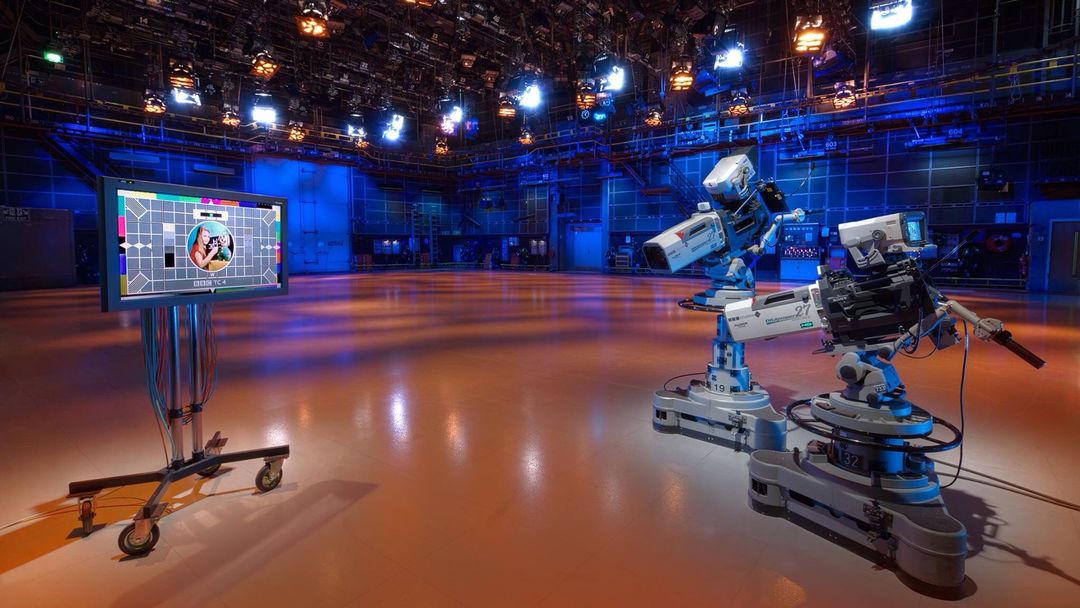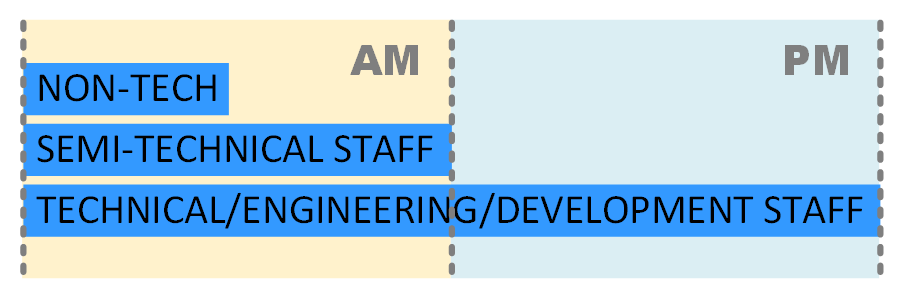The Broadcast Training Day
1 day

Overview
This 1 day Broadcast Training course is presented for a fixed price at your premises.
The schedule for the day has been put together to provide a cost effective way to address the often overlooked basics of the broadcast industry and its technology, whilst also having a positive impact on staff morale by encouraging back-office/admin staff to be included in the initial session(s).

All sessions are presenter-led with the 3rd ‘technology primer’ session being a lot less formal with scope for wider discussions and frequent tangential topics.
As can be seen by the diagram, the first session is suitable for all staff and has been run successfully to quite large groups (30+).
There is no upper limit to the number of attendees for each session but the later technical one is more effective when limited to a maximum of 10 people to allow questions to be adequately addressed.
Requirements
Broadcast Training Day sessions are held at a customer’s premises or nearby location to minimise staff travel costs. Session timing can be modified to suit attendees but would typically run from 9:30am through to 17:00 (possibly 18:00 if possible).
It is preferred for sessions to be held in a dedicated room conducive to open discussion. A HDMI capable 16:9 display or projector is required with a display size suitable for all attendees to be able to comfortably read a 16pt font.
10 printed copies of all course slides will be provided, additional copies can be printed by the customer as required as notes will also be shared as watermarked PDFs.
Internet connectivity (wired or WiFi) and a whiteboard or flipchart are beneficial but not critical if unavailable.
Sessions Aims & Target Audience
Session 1 (AM): Broadcast Industry Primer
- Introduces what is/isn’t the industry and broadcast chain, demystifies the vocabulary used
- Suitable for ALL STAFF (admin/non-technical/engineering/services/management)
Session 2 (AM): From The CRT to IP: The evolution of video and what you need to know about IP
- Accessible run-through the evolution of broadcast video and key concepts relating to IP
- Suitable for all semi-technical staff and anyone with an indirect technical interest
- Sets the scene well for Session 3 (i.e. outline scope of video tech before going into detail)
Session 3 (PM): Broadcast Technology Primer
- Basics of Audio, Video, Sampling, Digital/IP formats, Compression and other topics
- Suitable for all staff in technical roles
- Attendance recommended regardless of prior knowledge (solidify/correct understanding)
- Attendees encouraged to contribute experiences and sharing of knowledge with colleagues
Detailed Syllabus
The Broadcast Training Day syllabus below details the main topics covered in each session. This is not an extensive list – some topics and areas of detail have been omitted for brevity.
Slides make extensive use of animation to help explain concepts in an easily approachable way – no prior knowledge is needed for any session. Sessions are fast-paced and designed to cover a lot of topics (particularly in the afternoon ‘Technology Primer’ session). The intention is to give attendees an awareness of ‘what they don’t know’ and achieve some understanding of what makes broadcast special and the main concepts and operational and technological terminology.
Session 1: Broadcast Industry Primer (~90 minutes)
Introduces what is/isn’t the industry, explains the Broadcast chain and demystifies common vocabulary people may encounter.
- What IS the Broadcast Industry
- What ISN’T the Broadcast Industry
- The Broadcast Chain
- Lessons from History
- Technology Trends
- Trade Shows
- Industry Bodies
- Buzzwords
The session is suitable for ALL STAFF (admin/non-technical/engineering/developers/services/sales/management).

Session 2: From The CRT to IP: The evolution of video and what you need to know about IP (~60 minutes)
A fast-paced run-through the evolution of broadcast video and how technological decisions made in the early days still impact today’s migration to IP.
- Where it all started (analogue raster)
- Analogue Video SDI – lots of wasted space
- Networking Basics
- Packetising data & headers (layer model)
- TCP/UDP protocols for sending data
- IP Addressing
- Multicast / IGMPv2/v3
- PTP as the new Genlock
- SMPTE 2022-6 (“SDI over IP”)
- SMPTE 2110 (“Essence Based Flows”)
- NMOS IS-04 Discovery & Registration
- Traffic flow / packet pacing
The session also covers all the basics of IP in broadcast that all technical people should know. Suitable for all technical and semi-technical staff (or anyone with an interest in technology).

Session 3: Broadcast Technology Primer (3-4 hours)
This session packs everything into one intensive session introduced in an easy to understand way. More in-depth training may cover the same topics in 2-4 days but attendees will end the day with an appreciation and general understanding of key technologies and what areas may benefit from greater depth.
- Audio Fundamentals:
- dB Scales
- Components & Connectors
- Balanced Lines & Phase Reversal
- Digital Audio
- Sampling Theory, Quantisation and Coding (AES3)
- IP interfaces
- Multichannel Audio (incl. Dolby & MADI)
- Meters & Loudness (VU, PPM, dBFS, EBU r128)
- Video Fundamentals
- Interlace/Progressive Scanning & Framerates
- High Frame-Rate & High Dynamic Range
- Resolutions and Formats
- Colour Theory & Colour Spaces (incl. Wide Colour Gamut)
- Component Video (RGB >YCrCb)
- Digital Video
- SDI formats (8/10-bit)
- VANC Data, AFD etc.
- Video over IP
- Other topics depending on time and appropriateness:
- HDMI etc. (DVI, HDMI, DisplayPort, EDID, HDCP)
- Compression (General, Audio, Video)
- Files (Codces & Containers)
- DVB Multiplexing (MPEG-TS)
- Augmented Reality & VR
- More…
This is suitable for all staff in technical, engineering and development roles. Attendance is recommended regardless of prior knowledge. Those with existing knowledge may solidify or correct their understanding and are encouraged to share their experience with colleagues.

Pricing
Pricing for this course is £2,000-2,400 depending on equipment used. This is a fixed fee regardless of the number of attendees, however the recommended maximum number of attendees is 10 (limit not as important for the earlier non-technical sessions). Expenses are charged in addition to this base fee – an all-inclusive fixed price quote can be provided on request. Inclusive pricing covers all travel, subsistence, printing and other expenses plus access to PDF versions and access to view session recordings (for revision use).
View Our Other Courses
Broadcast Video & Technology for Developers
1 or 2 day course tailored to file and/or live workflows.
What makes Broadcast Video special? This short course is aimed at software developers who are working with solutions for use in broadcast. What are the key technology aspects everyone should know. The basics of Broadcast Video and Audio will be introduced, explaining important topics like interlace and colour sub-sampling (what is 4:2:0!?).
APIs and Web Technologies for Broadcast & Media
This highly practical, hands-on 2-day course introduces the technologies used to support web interfaces, the servers behind them, API (Application Programming Interface) integrations with other systems and data sources, and the security methods used to keep everything safe from attack.
No coding experience is necessary - this course is aimed at staff needing an awareness when working with software teams/vendors
Broadcast Engineering Essentials
3-5 day course covering the fundamentals of broadcast technology that every engineer and technician should know. Attendees of this course will be more confident and able to tackle any new technology challenges they may face is their broadcast systems evolve.
TR-1001 IP Media Networks
This session covers everything you need to know about IP-based networking for Media Production. It covers all the essential network protocols and standards for uncompressed video over IP (SMPTE ST 2022-6 / ST 2110) as well as looking at how to make such systems work through the use of PTP and NMOS specifications.
AutoCAD LT for Broadcast Engineers
2-day practical course (or 1-day abridged) covering all the tools and techniques for using AutoCAD LT in a broadcast setting. Focussing primarily on modifying existing broadcast system schematics (i.e. video and audio system diagrams), but also touching on rack layouts & more.
Practical Introduction to IP Networking
This hands-on 4-day course gives attendees greater confidence in understanding IP networks in a broadcast setting. Starting from the basics, trainees will learn everything they need to know (layer models, VLANs and Routing, TCP/IP, UDP Multicasting, RTP Streaming and more!)
Broadcast Industry & Technology Intro
This 1 or 2 day course has been put together to provide a cost-effective way to address the often-overlooked basics of the broadcast industry and its technology whilst also having a positive impact on staff morale by encouraging back-office/admin staff to be included in the initial session(s).
